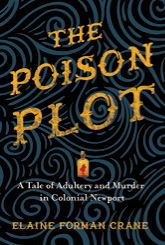 |
Subtitled A Tale of Adultery and Murder in Colonial Newport, this nonfiction book from Cornell University Press details the dramatic tale of Mary and Benedict Arnold, a prominent couple in 1730s Rhode Island. When Benedict (not to be confused with the infamous traitor of the American Revolution) became seriously ill and accused his much-younger wife of poisoning him, he petitioned the state’s General Assembly for a divorce. The ensuing trial, during which Benedict died, threw them both into the public eye and unearthed sordid details of infidelity, theft, fraud, and other improprieties.
Crane, a distinguished professor of history at Fordham University, draws on her deep knowledge of eighteenth-century New England to depict everyday life for both the elite and the common folk. She notes that while many modern-day Americans assume that their Colonial-era counterparts adhered to a strict moral code, cases like the Arnolds’ were surprisingly common—especially in a city where attempted murder was not yet a convictable offense. “The story told here complicates America’s master narrative,” Crane observes in the prologue, “by revealing a culture of corruption that competes with the positive messages delivered by Ben Franklin and other early advocates who posited one would do well.” Crane’s previous volumes include CU Press’s Killed Strangely, which explores the mysterious death of Rebecca Cornell—Ezra’s direct ancestor—in 1673.
|
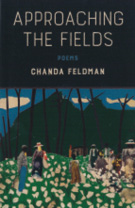 |
Feldman, an award-winning poet and past fellow at the Bread Loaf Writers’ Conference, has published in numerous literary journals including Cincinnati Review, Ecotone, and Prairie Schooner. In this collection of poems—whose topics range from sharecroppers along the Mississippi River to modern-day suburban life—the Tennessee native reflects on family history, racial discrimination, love, violence, and more. As Feldman writes in “But We Lived,” a meditation on segregation: “It always was and we never thought / it wouldn’t be—separate entrances / at the doctor’s, dentist, the fabric store, or / the places we knew not to go.”
|
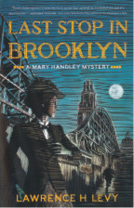 |
The third book in the Mary Handley mystery series finds its heroine—an independent and resourceful private investigator who challenges her era’s sexist norms as she solves crimes—once again at the center of murder and corruption in late-nineteenth-century New York City. Featuring such real-life figures as industrialist Andrew Carnegie, future U.S. President Teddy Roosevelt, and social reformer Jacob Riis, this entry follows Handley through Coney Island in summer 1894 as she trails a Jack-the-Ripper copycat. Levy chronicled Handley’s previous adventures in Second Street Station and Brooklyn on Fire.
|
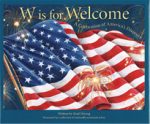 |
From the author of such alphabet books as S is for Save the Planet and T is for Touchdown comes this illustrated volume of verse and prose celebrating America’s diversity. Each letter stands for a patriotic and/or inclusive term such as “L is for Lady Liberty,” “R is for Refugees,” and “W is for the White House.” Under “F is for Freedom”: “Worship as you wish. / Speak out. Protest. Feel free. / So many people come here / for that opportunity.” Herzog, a longtime CAM contributing editor, has penned dozens of books for children and adults.
|
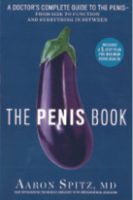 |
Informed by its author’s decades of medical experience—and featuring a smattering of comedy—this self-help book covers every-thing you’ve ever wanted to know about the male reproductive organ. Spitz, a practicing urologist who’s a clinical professor at the University of California, Irvine, is familiar to TV audiences for his appearances on shows like “Dr. Phil,” “The Doctors,” and “Real Housewives of Orange County.” Topics in this “complete guide to the penis” range from the pros and cons of circumcision to the consequences of sexually transmitted diseases to Spitz’s “five-step plan for maximum penis health.”
|
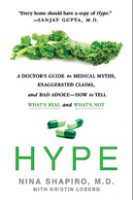 |
Hype
Nina Shapiro ’87
In a self-help book subtitled A Doctor’s Guide to Medical Myths, Exaggerated Claims, and Bad Advice, a surgeon and professor at UCLA combats an epidemic of medical misinformation on the Internet and elsewhere—addressing such topics as vaccines, supplements, exercise, dietary fads, research jargon, and how to read a food label. “We live in times filled with suspicion,” Shapiro writes. “Every day the media delivers swarms of health-related information that can swiftly trigger fear or inspire us to change our habits overnight . . . One day coffee is good for you and protective against dementia, the next day it’s declared a potential carcinogen.” Each chapter features “hype alerts” offering straightforward advice such as, “Worry more about getting into a common car accident than uncommon germs such as Ebola.” Says Publisher’s Weekly: “Her skeptical, no-nonsense approach and probing assessment of fact versus fiction make for lively reading that is likely to help readers make better health and medical choices.”
|











